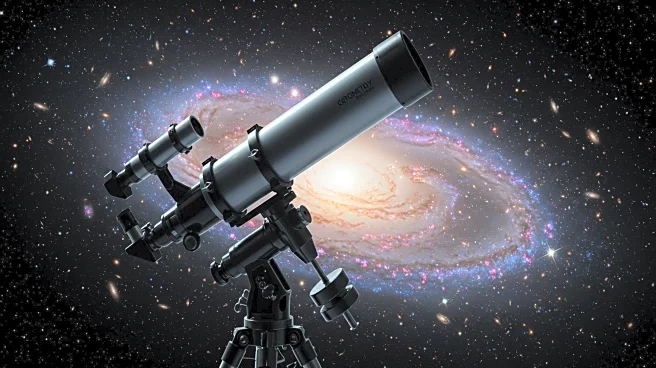What is the story about?
What's Happening?
Researchers using the James Webb Space Telescope have discovered a significant pattern in the rotational direction of ancient galaxies. Approximately 60% of these galaxies rotate clockwise, suggesting a potential cosmic order. This finding challenges existing cosmological models and has sparked debates within the scientific community. The study examined 263 ancient galaxies, some dating back to just 300 million years after the Big Bang, revealing a previously unrecognized order in the cosmos. This discovery has led to the proposal of groundbreaking hypotheses, including the possibility that our universe might be encapsulated within a massive black hole.
Why It's Important?
The implications of this finding are significant, as it suggests a level of cosmic structure that has yet to be fully understood. If galaxies across the universe share this directional alignment, it could point to a deeper, underlying order that governs cosmic dynamics. This revelation prompts scientists to explore new theories about galaxy formation and evolution, potentially indicating a shared origin or influence driving these rotational patterns. Understanding these cosmic dynamics may lead to a redefinition of the forces that shape our universe.
What's Next?
Among the theories emerging from this study, the most audacious is the suggestion that our universe might reside within a massive black hole. If this hypothesis is correct, the observed rotational uniformity of galaxies could result from the universe being under the gravitational sway of a black hole. This idea challenges conventional cosmological models and suggests a universe operating under the unique laws of a black hole’s environment. Researchers are also considering alternative explanations for the observed galactic rotations, such as the influence of observational bias, particularly the Doppler effect.
Beyond the Headlines
The potential realization that our universe may be contained within a black hole has profound implications for the field of cosmology. It challenges existing theories regarding the universe’s origins, structure, and eventual fate. If validated, this hypothesis would require a fundamental shift in our understanding of cosmic principles and the development of new models to explain the universe’s behavior in this unique context. This discovery emphasizes the importance of ongoing exploration and observation of the cosmos.















